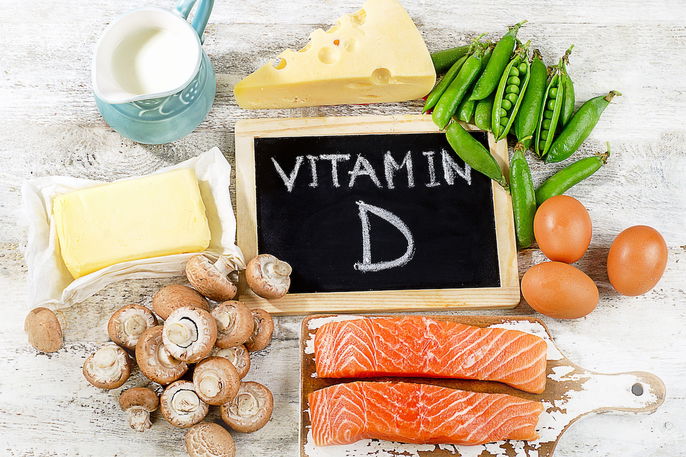Vitamin D foods are usually from animal sources, like salmon, oysters, cheese, milk and eggs. However, there are foods that can be fortified with vitamin D, like breakfast cereals and juices.
Although vitamin D is easily obtained from animal sources, it can also be produced in the body through sun exposure. It is therefore important to have some sun exposure for at least 15 minutes every day, between 10 a.m. and 12 p.m., and 3 p.m. and 4.30 p.m.
Vitamin D promotes the absorption of calcium in the intestines, which is important for strengthening the bones and teeth. Adequate levels of vitamin D are also important to prevent illnesses like rickets, osteoporosis, cancer, cardiac problems, diabetes and hypertension.

List of foods high in vitamin D
The following table indicates the amount of vitamin D per 100 grams of food:
Mushrooms can be a great source of vitamin D, as they require UV rays from the sun to synthesize this vitamin. However, to obtain vitamin D from consumption, they should be picked from the sun. You should opt for organic mushrooms when possible.
Vitamin D intake through food is especially important if there is not enough sun exposure for the production of the recommended daily amount of vitamin D. Children over 1 year old and healthy adults should obtain at least 15 mcg of vitamin D per day, while older people should have 20 mcg per day.
Does fruit contain vitamin D?
No, fruit does not naturally contain vitamin D. however, there are some pasteurized juices that have been fortified with this vitamin, like orange juice.
Daily recommended dose
If you are unable to obtain sufficient amounts of vitamin D from the sun, it is important to try to incorporate vitamin D foods into your diet. Children over 1 and healthy adults should aim for 15 mcg of vitamin D per day, while older adults should consume 20 mcg per day.
Vitamin D for vegetarians
Vitamin D is present in animal foods and in some fortified products. However, it is not naturally found in foods of plant origin like fruits, leafy greens and grains, such as rice, wheat, oats and quinoa.
As such, strict vegetarians or vegans that do not consume eggs, milk or dairy of any kind are advised to obtain vitamin D through sun exposure or through supplements recommended by a doctor or registered dietitian.
When to supplement
Vitamin D supplements should be taken when vitamin D levels in the blood are below normal, which can happen when a person has little sun exposure or when a person’s body undergoes changes in the fat absorption process (e.g. following bariatric surgery).
A serious vitamin D deficiency in can lead to rickets in children or osteomalacia in adults. These illnesses are confirmed through blood tests that checks the vitamin D levels in the blood, also known as 25-hydroxyvitamin D. Learn more about symptoms of vitamin D deficiency.
Generally, vitamin D supplements come with calcium as vitamin D is fundamental for the absorption of calcium in the body. These supplements are usually recommended for people with a history of bone abnormalities, like osteoporosis.
Supplementation should be recommended and monitored by a health care professional, who may prescribe either capsules or drops.






























